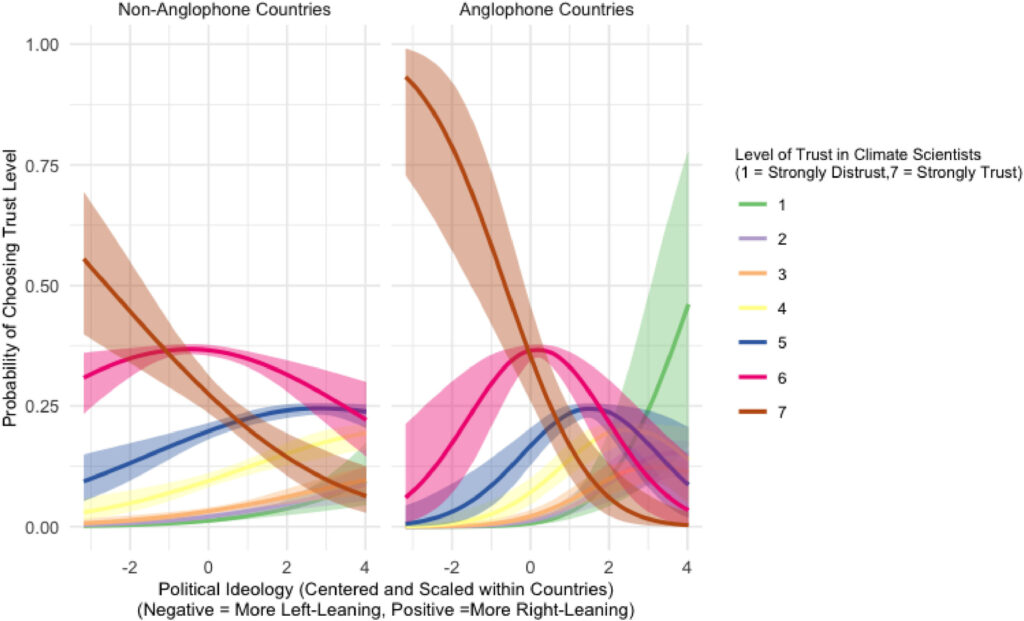
Trust in climate scientists significantly varies across the globe, as revealed by a comprehensive study spanning 26 countries. The research highlights how political ideologies shape this trust, with individuals on the political left generally more trusting of climate scientists than those on the right, particularly in affluent democracies and English-speaking regions.
The study, which you can find here, was published in the Journal of Environmental Psychology. It builds upon previous research primarily concentrated on Western, English-speaking nations.
Senior author Kai Ruggeri, Ph.D., from Columbia University Mailman School of Public Health, notes, “While climate scientists currently maintain fairly high levels of public trust—ranging from 58% in North America to 84% in South Asia—that trust is not held evenly across all groups.”
The research underscores the political divide in trust, which Ruggeri suggests is not a foregone conclusion. According to him, “the popularity of most climate policies is dramatically underrated, even across that divide.” He emphasizes the need for engagement across political spectrums to foster trust that transcends ideological boundaries.
The study analyzed survey data from over 10,000 participants. It found that political ideology strongly impacts trust in climate scientists, with a few notable exceptions. In countries like China and Indonesia, left-leaning individuals were more skeptical, while in Egypt and Georgia, political views had no significant impact, indicating climate change is less politicized there.
Development, Democracy, and Emissions
The findings reveal that distrust in climate scientists is pronounced in wealthier democratic countries with high greenhouse gas emissions. Researchers describe this as the “post-industrial paradox,” where scientific skepticism increases as countries develop, possibly due to a perception that science is less crucial to progress.
In these democracies, political divisions can exacerbate distrust, further fueled by well-funded misinformation campaigns often linked to fossil fuel interests.
Does Education Breed Distrust?
Preliminary evidence suggests that higher education may slightly amplify the connection between political ideology and distrust of climate scientists. The difference is minor, but it indicates that educated individuals might interpret scientific data through an ideological lens, potentially widening partisan divides on climate matters.
A Few Limitations
The study’s participant pool was predominantly young, with a higher proportion of educated women compared to the general population. This demographic skew means the findings may not be universally applicable.
Moreover, the study employed simple yes/no questions, which might not capture the full complexity of trust and political views. The researchers highlight the need to differentiate between trust in climate science and trust in scientists, as perceptions may differ.
Implications for Communications
To bridge the trust gap, the study suggests climate communication strategies must take into account ideological differences. Emphasizing the immediate impacts of climate change and involving locally trusted figures, such as community leaders and political representatives, could help convey scientific consensus effectively. These strategies must be tailored to fit national contexts, given the varying political landscapes.
Ruggeri stresses the importance of inclusive communication, stating, “Failing to consider the perspectives of entire populations will inevitably create roadblocks for evidence-based policies.” The study’s uniqueness lies in its execution by students and early career researchers, creatively utilizing data to address a critical issue.
More information:
Amanda Remsö et al, Trust in Climate Scientists is Associated with Political Ideology: A 26-Country Analysis, Journal of Environmental Psychology (2025). DOI: 10.1016/j.jenvp.2025.102609
Original Story at phys.org
